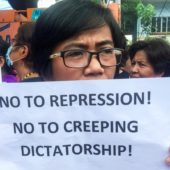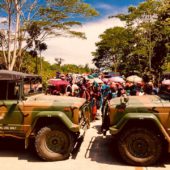Christian groups in the Philippines joined hands to ask the Supreme Court (SC) to strike down the contentious Anti-Terrorism Act of 2020 (ATL), as oral arguments commenced on Feb. 2.
“As oral arguments on the Anti-Terrorism Law of 2020 begin in the Supreme Court, we pray that sound judgment founded on our nation’s values and Constitutional protections of democracy, civil liberties, and the respect for human life and rights will guide the court,” noted ecumenical group One Faith. One Nation. One Voice.
To mark the beginning of a series of oral arguments on 37 petitions challenging the ATL, the group mounted on Tuesday a gathering for discernment, prayer and public action at the National Cathedral of the Iglesia Filipina Independiente (IFI).
Citing various concerns raised in the petitions, the statement read, “The Supreme Court is especially placed to judge these dangers and assure that civil liberties are safeguarded and democratic rights upheld.”
Signing the statement were Bishop Broderick Pabillo, the apostolic administrator of the Roman Catholic Archdiocese of Manila; Bishop Reuel Norman Marigza, the General Secretary of the National Council of Churches in the Philippines; the Most Rev. Rhee Timbang, Obispo Maximo of IFI; and many other leaders from faith groups, some had previously been red-tagged.
“We firmly stand against the ATL and join our people’s petition for the abolishment of this draconian law which only seeks to eliminate legal protections for legitimate dissent and permit unwarranted government rancor on its perceived enemies,” said the Board of Governors of the IFI National Priests Organization in a separate statement.
“We lament how the ATL has sharpened the claws and fangs of a state that thinks peace is in sheepish obedience,” the group said, calling the government out for its unwarranted attacks on individuals, including the ordained and laity of the IFI.
“Instead of protecting the country’s growing indigent population and competently battling the COVID-19 pandemic, the government has been busy ramming this unconstitutional measure into our throats,” the priests added.
Despite a social media blitz in the middle of the COVID-19 pandemic, Congress railroaded the antiterror bill on June 3, 2020, adopting a version that entirely copied the one earlier approved by the Senate. President Rodrigo Duterte signed the document into law, officially Republic Act No. 11749, on July 3.
The National Clergy Discernment Group, composed of Roman Catholic bishops, priests and brothers, also penned a letter to the SC justices noting that the law vaguely defined terrorism and that, based on international conventions, the concern was “not a national reality.”
“One cannot make a law for the whole for the sake of a tiny exception. One cannot make a law for a non-existent phenomenon,” the group noted. “Already before as now, RA 11479 legitimizes the terror experienced by the people at the hand of the State, its Security Forces and the Death Squads.”
“Let us join hands in prayer for our magistrates in the Supreme Court that God may enlighten their hearts and minds,” said Bishop Gerardo Alminaza of the Church People Workers Solidarity in a statement. He noted that killings and harassment are emboldened by the measure, and urged the SC to act against it.
Kalipunan ng Kristiyanong Kabataan sa Pilipinas, meanwhile, published a prayer in Filipino for the oral arguments. Among others, the ecumenical youth group asked for God’s “care and safety, especially for siblings who sit as lawyers, judges and petitioners, discussing the security and rights stolen” by the ATL.
The ATL racked up 37 petitions in the high court. Several are backed by academics, lawyers, development workers, framers of the 1987 Constitution and religious personalities, among others.
The first petition was filed a day after the President signed the law, the petitioners including La Sallian brother and former education secretary Brother Armin Luistro.
One lists Bishop Pabillo, Bishop Marigza, United Church of Christ in the Philippines Bishop Emergencio Padillo, Roman Catholic Bishop Gerardo Alminaza, Bishop Rex Reyes Jr. of the Episcopal Church in the Philippines and Dr. Aldrin Penamora of the Philippine Council of Evangelical Churches. Another has the frequently red-tagged Association of Major Religious Superiors in the Philippines, one leader of which is facing a perjury charge with Ramento Project for Rights Defenders’ own Rev. Wilfredo Ruazol and personalities from rights watchdog Karapatan, among others.
The Feb. 2 hearing consolidates several petitions, including the first one, as well as those by Albay Rep. Edcel Lagman and the Makabayan bloc. The next oral argument is scheduled for Feb. 9.
All petitions allege that the law threatens freedom of speech. They also challenge provisions in the act, such as the very definition of terrorism; the parameters of a terror threat; planning and facilitating the commission of terrorism; and providing material support to terrorists.
The law also gives a council made up of people from the executive branch the right to designate terrorists and detain for longer periods without a warrant of arrest, a feature many critics believe threaten the judiciary.
Furthermore, most petitions plead for the issuance of a temporary restraining order that would stop the implementation of the law, which took effect 15 days after its signing. The high court announced it would decide on the appeals as soon as the oral arguments are over.
Leading the defense team for the ATL is Solicitor General Jose Calida. Some five others from the Office of the Solicitor General join the team.
Oral arguments were first scheduled September last year. These were then postponed to Jan. 19 to allow the SC to receive more petitions.
The date was again moved to Feb. 2 after the SC granted Calida’s request to reschedule on the grounds that lawyers in his team tested positive for COVID-19. He tried to stall the arguments again citing the psychological trauma caused by COVID-19 on his team, to no avail.
One of the arguments for the ATL lies in the lack of an actual case or controversy. Calida and his team noted that the petitioners were only talking about hypotheticals.
Hoping to address this gap, two Aetas who had been charged under the ATL asked just hours before the oral arguments began for the high court to permit them to intervene.
Japer Gurung and Junior Ramos filed a petition-in-intervention. They were arrested on Aug. 21 last year for allegedly killing a soldier in a gunfight in San Marcelino, Zambales. They are being held at the Olongapo City Jail.
They were charged with murder, attempted murder, illegal possession of firearms and explosives, and terrorism under Section 4 of the ATL, among others. The two are facing the first known case of alleged violation of the ATL.
The two, in their pleading, sought “to become litigants in these cases for the purpose of protecting their rights and interest, which will be affected by the outcome of these proceedings.”


